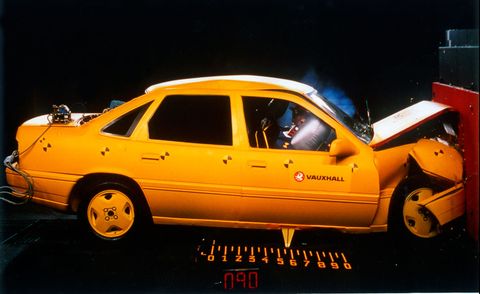- New vehicles are regularly passing the Insurance Institue for Highway Safety’s vehicle-to-vehicle front crash prevention with flying colors, with 85 percent of the 2022 vehicles tested managing to hit the Top Safety Pick+ level.
- Since 2013, IIHS has tested this particular crash situation at 12 and 25 mph.
- The group is considering increasing the speed limits for this test to maybe 35 or 45, which is when more crashes like this happen.
The never-ending back-and-forth between automakers and safety rating agencies is about to take another step forward. The Insurance Institute for Highway Safety (IIHS) announced this week that it is taking a look at increasing the speed it conducts front-to-rear crash tests.
Blame car companies that have simply gotten too good at acing IIHS’s current test regimen, which uses a vehicle-to-vehicle front crash prevention test that was introduced in 2013. This test simulates what happens when a car hits another car that’s stopped in the road.
IIHS conducts two tests in this format: one at 12 mph and a second at 25 mph. Since the 2014 model year, IIHS has required cars to achieve a Basic, Advanced, or Superior rating in order to earn the honor of Top Safety Pick+.
For the 2022 model year, 85 percent of all the cars IIHS tested reached this level, mostly because automakers have been busy adding automatic emergency braking (AEB) systems to their vehicles, part of a voluntary commitment made with IIHS and the National Highway Traffic Safety Administration (NHTSA). IIHS reported that last year 12 major automobile manufacturers equipped almost all of their light duty vehicles with AEB—ahead of the agreed-upon deadline of September 2022.
“The automaker commitment to fit AEB as standard equipment will go into effect at the end of this year and the performance requirements for that commitment are based on our current tests,” IIHS’s director of media relations, Joe Young, told Car and Driver. “Effectively, the commitment is making the current test obsolete. The commitment is a big win for consumers, who won’t need to shop for a specific trim line or package to get this proven safety technology on their next new vehicle. And a new test, when it’s launched, will help push the technology even further.”
So, if everyone is already passing the test, how do you know which cars deserve better rankings? You test for front-to-rear crashes at higher speeds. Young said IIHS will start researching different test speeds this summer in order to figure out the new test’s exact rules. The time it will take to determine the new protocols means upgraded vehicle-to-vehicle front crash prevention ratings won’t factor into the group’s 2023 Top Safety Picks.
IIHS researchers found that only 3 percent of the rear-end crashes they had police reports for happened at the low speeds today’s test looks at (under 25 mph). Raising the test speed to between 35 and 45 mph would match the real-world speeds where more accidents happen. A 45-mph limit would cover 43 percent of the police-reported rear-end crashes and 12 percent of fatal rear-end crashes, IIHS found.
Young said updating this vehicle-to-vehicle crash test is similar to how IIHS recently updated its side crash test.
“We were at a point where the current side crash test wasn’t differentiating among current models, so we raised the bar, and we’re seeing a wide range of performance in the new test,” he said. “We expect that when we update the vehicle-to-vehicle front crash prevention test we’ll see a similar range in performance that will give automakers incentive to improve their systems. It will also give consumers important information when comparing vehicles.”
This content is imported from {embed-name}. You may be able to find the same content in another format, or you may be able to find more information, at their web site.
This content is created and maintained by a third party, and imported onto this page to help users provide their email addresses. You may be able to find more information about this and similar content at piano.io

